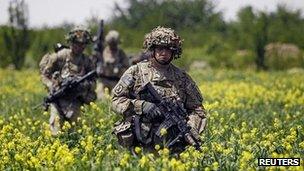Human Right Watch: West 'ignores Uzbekistan abuses'
- Published

Uzbekistan has become a major supply route to NATO forces in Afghanistan
Western governments are ignoring human rights abuses in Uzbekistan as they seek closer ties with the country, Human Rights Watch (HRW) says.
In a new report, the campaign group says Uzbekistan is continuing to use torture, external in its criminal justice system.
The report documents cases of detainees being subjected to physical and psychological torture.
Western countries have dramatically weakened their stance on human rights in the central Asian country, it says.
There has been no comment as yet from the Uzbek government on the report.
The 107-page document makes for a chilling read, says the BBC's Central Asia correspondent Rayhan Demytrie.
It is based on interviews with torture victims, their families, lawyers and human rights activists.
One torture case describes police officers handcuffing an espionage suspect and burning his genitals with a lighted newspaper.
Others include allegations of interrogators pouring boiling water on an activist, beating detainees, hanging them by their wrists and ankles and subjecting them to rape and asphyxiation.
The report also alleges that Tashkent has been disbarring some of the country's most outspoken lawyers, as well as routinely denying detainees access to legal counsel.
Human Rights Watch calls on governments to consider punitive measures such as asset freezes and visa bans for Uzbek officials alleged to have been involved in torture.
Supply route
The report criticised the EU for dropping sanctions on Uzbekistan two years ago, while the US moved in September to waive Congressional human rights restrictions on assistance, including on military aid, to the Uzbek government.
Steven Swerdlow, who was the head of Human Rights Watch's Uzbek programme before being expelled from the country, criticised the United States and European Union countries for their close ties to the "dictatorial regime".

"That's because Uzbekistan borders Afghanistan, and Uzbekistan has this single functioning rail line from the north to the south into Afghanistan", Mr Swerdlow told the BBC.
"And the United States and the EU have of late, moved away from criticising the human rights situation in favour of co-operating with the country in order to supply their troops in Afghanistan," he says.
Washington officials insist that it is important to remove restrictions on military aid.
"We need this waiver to allow the United States to provide defensive equipment to enhance Uzbekistan's ability to protect its border through which a lot of cargo that is destined for our troops in Afghanistan is passing," says US Assistant Secretary of State Robert Blake.
"But we raise human rights on every occasion that we have engagement with Uzbekistan," he told the BBC.
Uzbekistan is now a key part of the Northern Distribution Network (NDN) - an increasingly important supply route for NATO troops in Afghanistan.
It is an alternative route to the one through Pakistan shut down last month following a NATO air strike that killed 24 Pakistani soldiers.
More than half of US supplies are already shipped to Afghanistan through Central Asia.
- Published20 September 2011